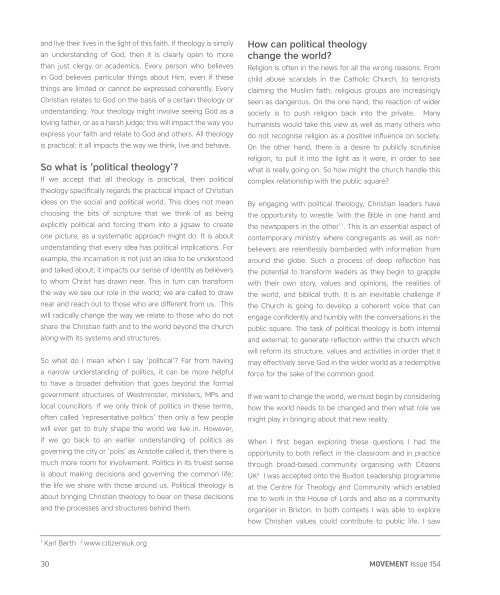Movement magazine issue 154
The Student Christian Movement's magazine.
The Student Christian Movement's magazine.
You also want an ePaper? Increase the reach of your titles
YUMPU automatically turns print PDFs into web optimized ePapers that Google loves.
and live their lives in the light of this faith. If theology is simply<br />
an understanding of God, then it is clearly open to more<br />
than just clergy or academics. Every person who believes<br />
in God believes particular things about Him, even if these<br />
things are limited or cannot be expressed coherently. Every<br />
Christian relates to God on the basis of a certain theology or<br />
understanding. Your theology might involve seeing God as a<br />
loving father, or as a harsh judge; this will impact the way you<br />
express your faith and relate to God and others. All theology<br />
is practical; it all impacts the way we think, live and behave.<br />
So what is ‘political theology’?<br />
If we accept that all theology is practical, then political<br />
theology specifically regards the practical impact of Christian<br />
ideas on the social and political world. This does not mean<br />
choosing the bits of scripture that we think of as being<br />
explicitly political and forcing them into a jigsaw to create<br />
one picture, as a systematic approach might do. It is about<br />
understanding that every idea has political implications. For<br />
example, the incarnation is not just an idea to be understood<br />
and talked about; it impacts our sense of identity as believers<br />
to whom Christ has drawn near. This in turn can transform<br />
the way we see our role in the world; we are called to draw<br />
near and reach out to those who are different from us. This<br />
will radically change the way we relate to those who do not<br />
share the Christian faith and to the world beyond the church<br />
along with its systems and structures.<br />
So what do I mean when I say ‘political’? Far from having<br />
a narrow understanding of politics, it can be more helpful<br />
to have a broader definition that goes beyond the formal<br />
How can political theology<br />
change the world?<br />
Religion is often in the news for all the wrong reasons. From<br />
child abuse scandals in the Catholic Church, to terrorists<br />
claiming the Muslim faith, religious groups are increasingly<br />
seen as dangerous. On the one hand, the reaction of wider<br />
society is to push religion back into the private. Many<br />
humanists would take this view as well as many others who<br />
do not recognise religion as a positive influence on society.<br />
On the other hand, there is a desire to publicly scrutinise<br />
religion, to pull it into the light as it were, in order to see<br />
what is really going on. So how might the church handle this<br />
complex relationship with the public square?<br />
By engaging with political theology, Christian leaders have<br />
the opportunity to wrestle ‘with the Bible in one hand and<br />
the newspapers in the other’ 1 . This is an essential aspect of<br />
contemporary ministry where congregants as well as nonbelievers<br />
are relentlessly bombarded with information from<br />
around the globe. Such a process of deep reflection has<br />
the potential to transform leaders as they begin to grapple<br />
with their own story, values and opinions, the realities of<br />
the world, and biblical truth. It is an inevitable challenge if<br />
the Church is going to develop a coherent voice that can<br />
engage confidently and humbly with the conversations in the<br />
public square. The task of political theology is both internal<br />
and external; to generate reflection within the church which<br />
will reform its structure, values and activities in order that it<br />
may effectively serve God in the wider world as a redemptive<br />
force for the sake of the common good.<br />
In our generation,<br />
we can be<br />
overwhelmed by<br />
huge questions<br />
and the realities<br />
of injustice. I<br />
find solace in<br />
remembering that<br />
in the relatively<br />
short time I have<br />
on earth there is<br />
something I can<br />
do, but this is not<br />
everything.<br />
the direct links between religion and politics<br />
by working for the All-Party Parliamentary<br />
Groups on freedom of religion or belief 3 .<br />
Through my work in Brixton I developed the<br />
ability to build power with people rather than<br />
over them. I learned to listen to peoples<br />
stories and to tell my own, and develop<br />
Christian leaders by teaching them to act in<br />
public life.<br />
These are a few things I have learned so far<br />
in exploring political theology in practice:<br />
1. The means are as important as the end<br />
So many people talk about vision; for their<br />
life, for their church; for their community.<br />
We are caught up in a daydream, imagining<br />
all the new things that are possible in life.<br />
We are pushed to dream bigger, to have a<br />
broader vision and to do all we can to make<br />
it happen. We pray ‘your kingdom come’ and<br />
we use all our energy to pull it down pronto!<br />
However, in the process, it is so easy to<br />
forget that how we get there is as important<br />
as getting there (wherever ‘there’ is). If we<br />
use manipulative and underhanded tactics<br />
to get to where we think we need to go, will<br />
that count as success in the end? God does<br />
not simply give us a vision to get to, he is<br />
clear that our character should reflect him<br />
in the process.<br />
fulfil our own self-interest? It is possible that<br />
in our pursuit of good things we neglect the<br />
people God made, and has called ‘good’?<br />
This is especially common in areas of work<br />
which are all for good causes. The core of<br />
my work as a community organiser is oneto-one<br />
meetings with leaders to ensure that<br />
people are loved not used. Do we spend<br />
time getting to know the people around us?<br />
How much do we really value people in our<br />
actions and encourage them to flourish?<br />
3. God really is in control, but you need to<br />
do your bit<br />
Finally, on the road to seeing the world<br />
changed, there will always be moments of<br />
challenge which will threaten your resolve<br />
and your focus. In our generation, we can<br />
be overwhelmed by huge questions and<br />
the realities of injustice. I find solace in<br />
remembering that in the relatively short<br />
time I have on earth there is something I<br />
can do, but this is not everything. I cannot<br />
fix the global economy, end poverty and<br />
eradicate injustice, and for whatever reason<br />
God does not do these things either in the<br />
way we think he should. An understanding<br />
of the sovereignty of God which includes a<br />
human call to responsible action is definitely<br />
required to enable balanced and hopeful<br />
engagement.<br />
government structures of Westminster, ministers, MPs and<br />
local councillors. If we only think of politics in these terms,<br />
often called ‘representative politics’ then only a few people<br />
will ever get to truly shape the world we live in. However,<br />
if we go back to an earlier understanding of politics as<br />
governing the city or ‘polis’ as Aristotle called it, then there is<br />
much more room for involvement. Politics in its truest sense<br />
is about making decisions and governing the common life;<br />
the life we share with those around us. Political theology is<br />
about bringing Christian theology to bear on these decisions<br />
and the processes and structures behind them.<br />
If we want to change the world, we must begin by considering<br />
how the world needs to be changed and then what role we<br />
might play in bringing about that new reality.<br />
When I first began exploring these questions I had the<br />
opportunity to both reflect in the classroom and in practice<br />
through broad-based community organising with Citizens<br />
UK 2 I was accepted onto the Buxton Leadership programme<br />
at the Centre for Theology and Community which enabled<br />
me to work in the House of Lords and also as a community<br />
organiser in Brixton. In both contexts I was able to explore<br />
how Christian values could contribute to public life. I saw<br />
2. People must come before programme<br />
God loves people, but often we fail at this.<br />
Maybe we think that although God says that,<br />
what he really loves is success and progress.<br />
Sometimes we are tempted to stand on the<br />
heads of other people if it means we can build<br />
a global ministry or launch a social justice<br />
project. This is symptomatic of a failure to<br />
take God’s love seriously. Do we love people<br />
practically by making decisions that are for<br />
their own good as opposed to using them to<br />
Selina Stone works for the Centre of<br />
Theology and Community, and directs the<br />
William Seymour Programme engaging<br />
Pentecostal churches in community<br />
organising, harnessing potential for the<br />
development of leaders and congregations.<br />
To find out more about Selina’s work and<br />
the centre’s internship programme visit<br />
www.theology-centre.org<br />
1<br />
Karl Barth 2 www.citizensuk.org 3<br />
www.freedom-declared.org<br />
30 MOVEMENT Issue <strong>154</strong> MOVEMENT Issue <strong>154</strong><br />
31




